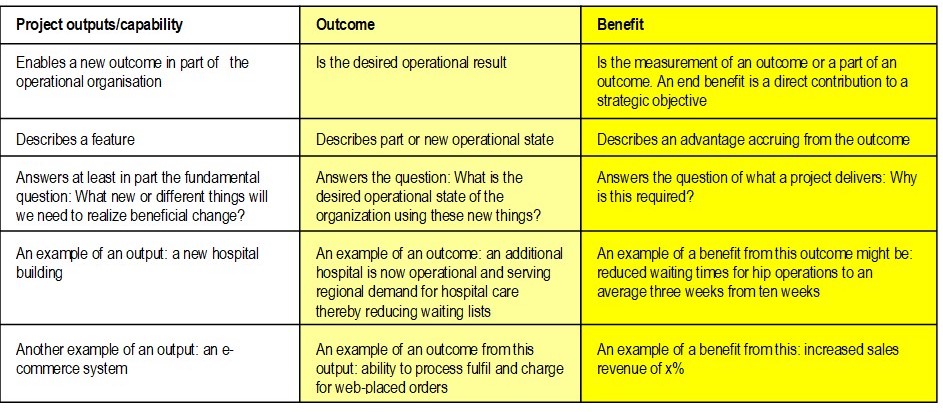outcomes, and benefits realization in an organisational strategic management context
FEATURED PAPER
By Alan Stretton, PhD (Hon)
Sydney, Australia
INTRODUCTION
In a recent, and rather exploratory, article in this journal (Stretton 2020e) I developed a categorisation of organisational strategic initiatives (and their component projects) in the context of different groupings of responsibilities for managing the ultimate realisation of benefits from these strategic initiatives. This categorisation identified three broad categories of such initiatives, in two major groupings, as shown in Figure 1 below. These do not claim to be comprehensive, but they do appear to be reasonably representative, particularly for the commercial types of strategic initiatives.
Amongst other conclusions, it was shown that there are very many types of project-related undertakings where project/ program management has no involvement in, or responsibilities for, the ultimate realisation of benefits. Some of these types of situations are illustrated in the following figure from the summary of Stretton 2020e.

Figure 1: Types of strategic initiatives, and responsibilities for benefits realisation management
Stretton 2020e was primarily concerned with responsibilities for benefits realisation management (BRM), rather than with actual processes involved. This article will look at some project-related outputs-outcomes-benefits processes from the literature, and relevant responsibilities for them. We start with some definitions, descriptors and synonyms associated with various presentations of these processes.
PROJECT/PROGRAM-RELATED OUTPUTS, OUTCOMES AND BENEFITS
Some definitions/descriptors
We first distinguish between project/program-related outputs, outcomes, and benefits, using definitions from the project management literature.
Output: The tangible or intangible product resulting from planned activity. (OGC 2007:247)
Some synonyms for Outputs: Capability (OGC 2007),
Results, Deliverables, Products (Driver & Seath 2015).
Outcome: The result of change, normally affecting real-world behaviour and/or circumstances. … (OGC 2007:247)
A virtual synonym for Outcomes: Uses (Driver & Seath 2015).
Benefit: The measurable improvement resulting from an outcome perceived as an advantage by one or more stakeholders. (OGC 2007:245)
Some writers do not distinguish between outcomes and benefits
Some writers use one or other of the descriptors outcomes and benefits in a more or less interchangeable manner. Indeed, some actually combine the two. For example, in the abstract of their paper, Zwikael & Smyrk 2009 use the descriptor outcomes (benefits). In effect, they are discussing “beneficial outcomes”. However, others see the distinction as important, as now discussed.
OGC 2007: Some detailed differences between outputs, outcomes and benefits
OGC 2007 has more to say about these differences than any other source I have come across, as is represented in the following figure.

Figure 2: OGC 2007 – Table 7.1 Differences between outputs, outcomes and benefits
SOME PROJECT-RELATED OUTPUTS-OUTCOMES-BENEFITS PROCESSES
Driver & Seath 2015: A basic project-related outputs-outcomes-benefits process
The following figure is based on an article by Driver & Seath 2015. The acronym PRUB derives from their observation that “Organisations run Projects that produce Results, which citizens or communities Use to create Benefits”. I have added the approximate synonyms [Outputs] and [Outcomes] to link their descriptors with those in the main heading above.
More…
To read entire article, click here
How to cite this paper: Stretton, A. (2020). Notes on project-related outputs, outcomes, and benefits realization in an organisational strategic management context; PM World Journal, Volume IX, Issue VIII, August. Available online at https://pmworldlibrary.net/wp-content/uploads/2020/07/pmwj96-Aug2020-Stretton-Notes-on-outputs-outcomes-benefits-realization.pdf
About the Author

Alan Stretton, PhD
Faculty Corps, University of Management
and Technology, Arlington, VA (USA)
Life Fellow, AIPM (Australia)
![]()
Alan Stretton is one of the pioneers of modern project management. He is currently a member of the Faculty Corps for the University of Management & Technology (UMT), USA. In 2006 he retired from a position as Adjunct Professor of Project Management in the Faculty of Design, Architecture and Building at the University of Technology, Sydney (UTS), Australia, which he joined in 1988 to develop and deliver a Master of Project Management program. Prior to joining UTS, Mr. Stretton worked in the building and construction industries in Australia, New Zealand and the USA for some 38 years, which included the project management of construction, R&D, introduction of information and control systems, internal management education programs and organizational change projects. He has degrees in Civil Engineering (BE, Tasmania) and Mathematics (MA, Oxford), and an honorary PhD in strategy, programme and project management (ESC, Lille, France). Alan was Chairman of the Standards (PMBOK) Committee of the Project Management Institute (PMI®) from late 1989 to early 1992. He held a similar position with the Australian Institute of Project Management (AIPM), and was elected a Life Fellow of AIPM in 1996. He was a member of the Core Working Group in the development of the Australian National Competency Standards for Project Management. He has published over 200 professional articles and papers. Alan can be contacted at alanailene@bigpond.com.au.
To see more works by Alan Stretton, visit his author showcase in the PM World Library at http://pmworldlibrary.net/authors/alan-stretton/.









